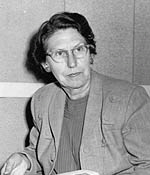Juanita Brooks: Mormon Historian
Juanita Leavitt Pulsipher Brooks was a historian and controversial author of histories related to the Mountain Meadows massacre.
She was born on January 15, 1898, in Bunkerville, Nevada. She attended one year of normal school then taught school. She married Ernest Pulsipher in 1919, and he died of cancer less than eighteen months later, leaving her with one son to care for on her own. She attended Dixie Junior College in St. George then earned her bachelor’s degree from Brigham Young University. She left her son in the care of her parents to pursue and earn her master’s from Columbia University. She returned to St. George and took a position at Dixie College as an English and debate instructor. Later she was dean of women. She resigned her position in 1933 to marry widower Will Brooks. He had four sons from his previous marriage and together they had a daughter and three more sons.
While she was a busy wife and mother, she wrote a biography about her grandfather Dudley Leavitt. She collected pioneer diaries from her region for the Works Progress Administration (WPA) and the Huntington Library. She edited a number of those diaries, including Hosea Stout. She wrote numerous articles and essays about the history of Dixie, including essays on desert irrigation, polygamy, and Jacob Hamblin and the Indians of southern Utah.
Her interest in the Mountain Meadows massacre led her to receiving a Rockefeller Foundation grant and researching for fifteen years. She published The Mountain Meadows Massacre in 1950 and John Doyle Lee: Zealot, Pioneer Builder, Scapegoat in 1961. These books both won her a position as a respected historian and labeled her as a Mormon dissenter. Her non-Mormon publisher asked her about the possibility of her excommunication and she replied, “I do not want to be excommunicated from my church for many reasons, but if that is the price that I must pay for intellectual honesty, I shall pay it—I hope without bitterness.”[1] The issue was besmirching the good name of The Church of Jesus Christ of Latter-day Saints, of which she was a member. She was not, however, disfellowshipped or excommunicated. In the foreword of her book, she wrote: “This study is not designed either to smear or to clear any individual; its purpose is to present the truth. I feel sure that nothing but the truth can be good enough for the church to which I belong.” Later her history was used as a foundation for the work of Ronald W. Walker, Richard E. Turley Jr., and Glen M. Leonard on a history entitled Massacre at Mountain Meadows, published by Oxford University Press in 2008.
Brooks served for twenty-four years on the board of the Utah Historical Society. She traveled widely to speak on historical topics. She received the Distinguished Service Award from the Utah Academy of Science, Arts, and Letters and honorary degrees from Utah State University and the University of Utah.
Brooks penned an autobiography, Quicksand and Cactus: A Memoir of the Southern Mormon Frontier (1982). She died on August 26, 1989.
External Links
Susan Easton Black and Mary Jane Woodger, Women of Character (American Fork, Utah: Covenant, 2011)
